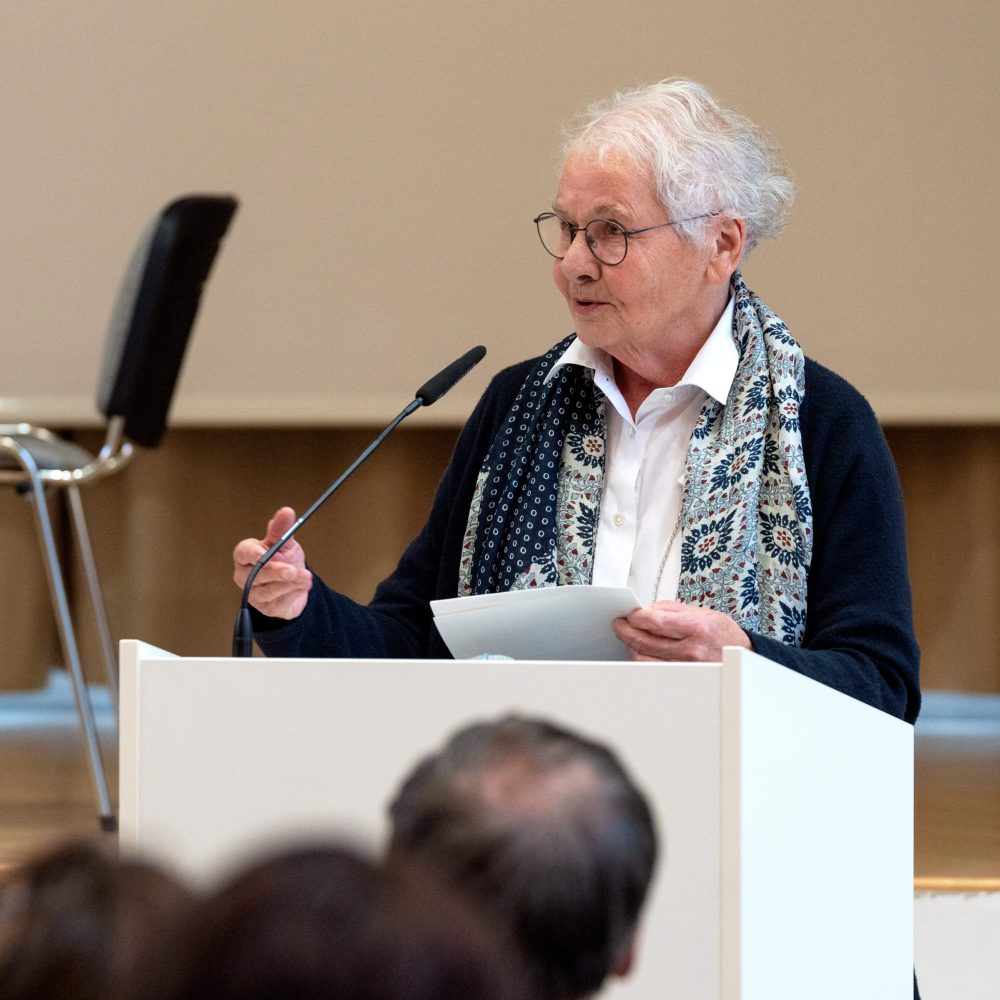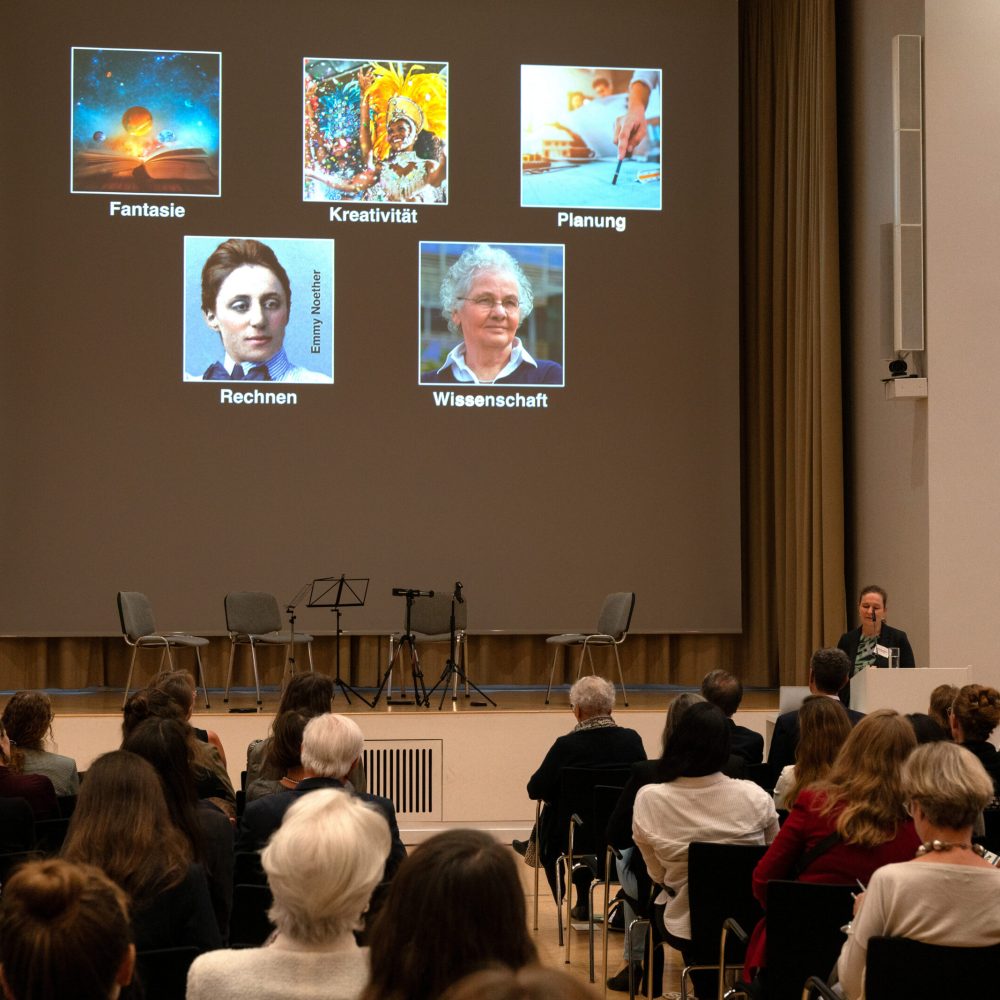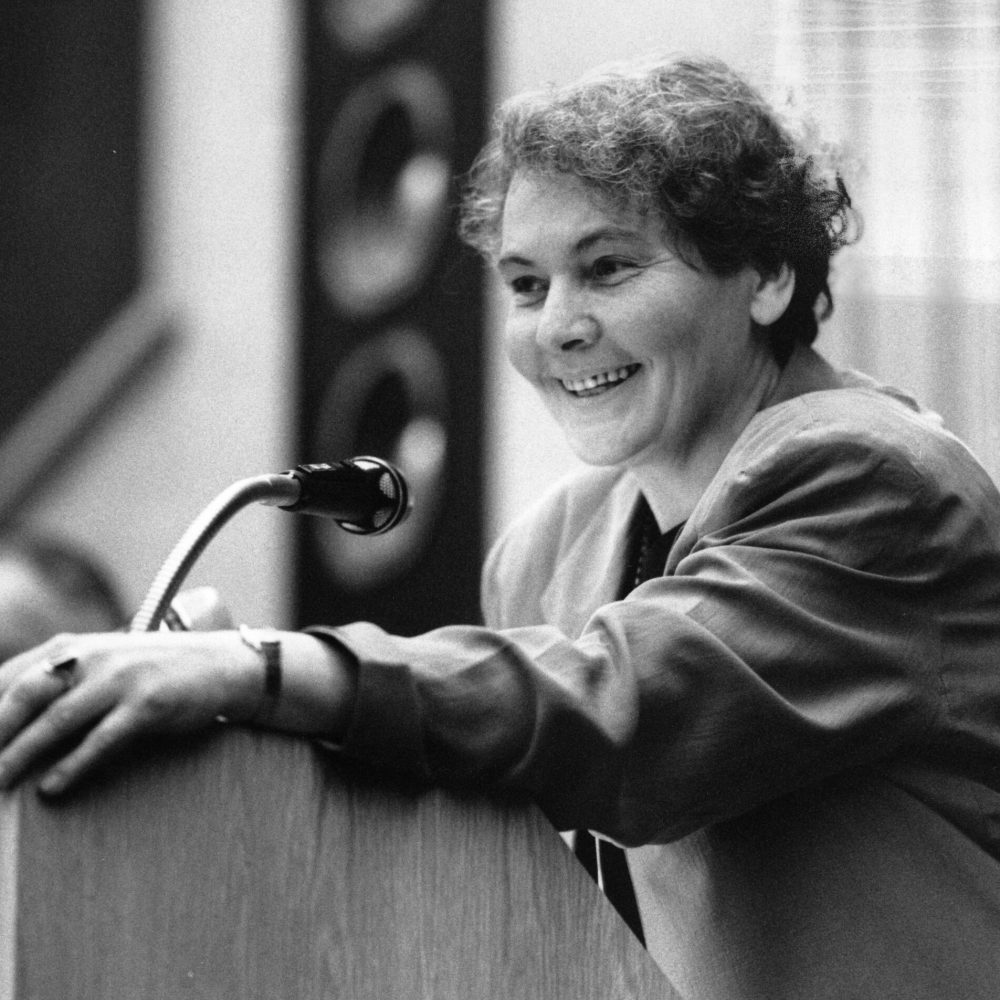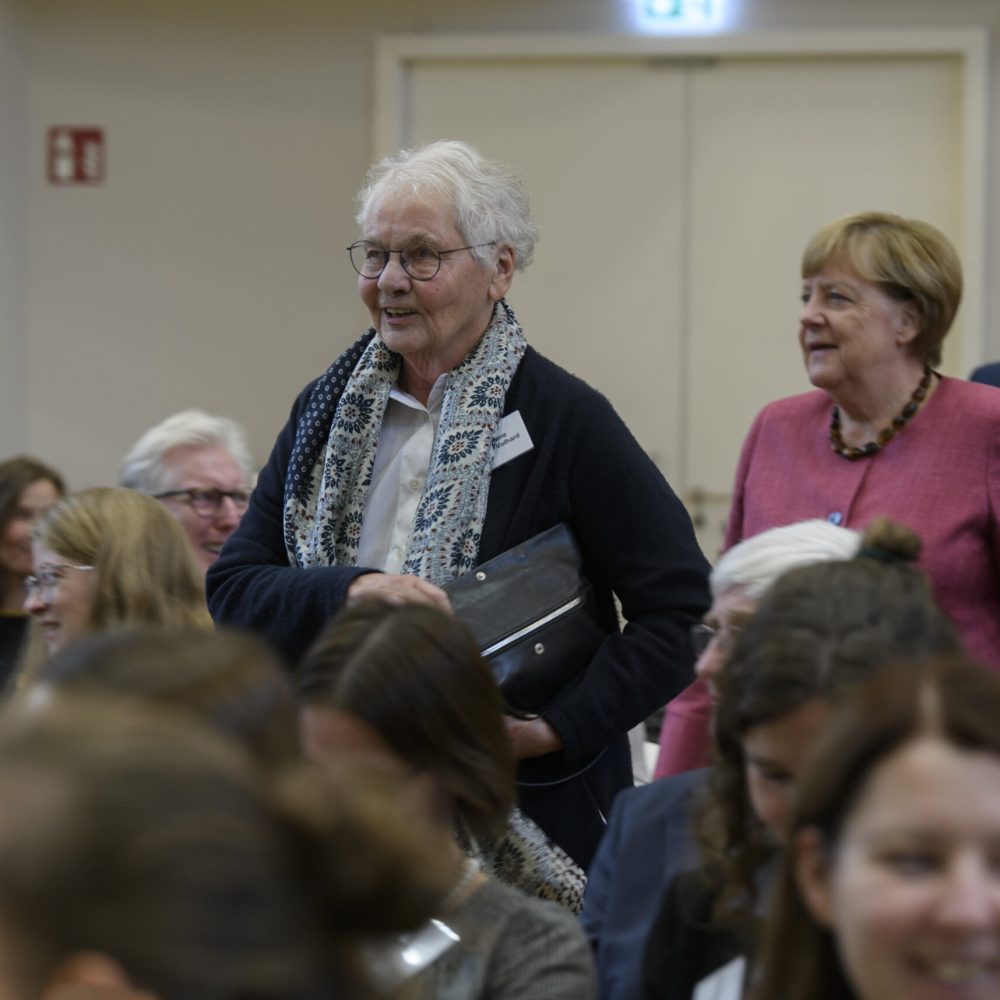Promoting female scientists.
Encouraging female scientists.
‘With our funding, we (also) provide the scholarship holders with moral encouragement by trusting them to succeed in their careers, even though they have less time available than their childless colleagues.’
– Christiane Nüsslein-Volhard on the occasion of the 20th anniversary of the CNV Foundation

Promote science. Strengthen talent. Create equal opportunities.

About the foundation
What we do.

Establishment in 2004
Where we come from.

20th anniversary 2024
What we celebrate.
About the foundation
The CNV Foundation is dedicated to making it easier for talented women with children to pursue a career as scientist. We aim to support PhD candidates and postdocs by providing financial grants for childcare and household assistance. This gives young mothers more time and flexibility for their scientific work.
Pursuing a career in science is a demanding and outstanding profession that requires not only a high level of talent but also great interest, passion, diligence and early independence. In order to achieve the profile necessary for a successful career, mobility and freedom in choosing the appropriate environment are essential, along with ample uninterrupted time to conduct high-quality independent research. For female scientists with children, time constraints and limitations on freedom inevitably become significant challenges. Prolonged career interruptions or part-time jobs are risky, as re-entering the field may be difficult, the missed time cannot always be made up, and much of the expertise already gained may have become outdated. We aim to help young talented women who are serious about their careers to get through the period of double burden and still do excellent research.
read more
The foundation is aimed at outstanding female scientists in the fields of experimental natural sciences and basic medical research. The CNV Foundation supports PhD students from the second year of their doctoral program, as long as their thesis is still in the practical phase. Among postdoctoral researchers, we prefer to support those who have switched fields after completing their PhD unless there are very compelling reasons for having continued in the same field. Applications are open to female PhD students and postdocs of all nationalities who are conducting research at universities and research institutes in Germany, as well as to female postdocs who have obtained their PhD at a German university and are continuing their research abroad.
The CNV Foundation provides funds to help relieve the burden of household and childcare. These funds can be used, for example, to hire domestic help, purchase appliances such as dishwashers or washing machines, and for additional childcare (e.g. babysitting in the evenings or while travelling to conferences). The funds are not intended to cover the living expenses of the scholarship holder and her family. These must already be secured. It is also assumed that the scholarship holder will work full-time during the funding period and that full-time childcare for the child/children is guaranteed and financed by a daycare or a nanny.
Establishment of the foundation in 2004
Christiane Nüsslein-Volhard on the occasion of the founding of the CNV Foundation
Being a scientist is a very demanding and outstanding profession. Not everybody is suited for the type of work that very early on requires a high degree of independence. Already when writing a dissertation it is of crucial importance to decide independently what directions to take. Competition is fierce and there is always more to be done than one can or would like to. Being a scientist is a vocation that requires a great deal of engagement and motivation, as well as talent, originality, and intelligence.
The necessity of distinguishing oneself increases during the course of one’s career. While the dissertation is largely credited to the supervisor, the selection of the postdoctoral project and its execution is made independently. More often than not this first autonomous work is the making or breaking point of continuing on the path to a career in the sciences. A 10-14 hour day and a regular presence in the laboratory even on week-ends are custom among scientists conducting experimental research.
read more
It is interesting to note in this context that fellows at English colleges, even up to the end of 19th century, were not married. This celibacy probably was instantiated so that they could devote their entire energy to science. During the first half of the 20th century, when the first women became professors they remained of course unmarried and the daily chores of the house were delegated to a housekeeper. Male academics of that time usually had a wife, who did not hold a job; and then there were of course servants.
Today having servants is considered very unusual and virtually unaffordable. Ideally the male half of a partnership pitches in doing chores around the house. With the presence of children, however, the physical strain and temporal involvement is usually higher on the part of the woman and the shortage of time turns into an inevitable problem. It is necessary to show strong dedication to science to attain any kind of autonomous research or teaching position. This may not be possible if the burden of family responsibilities is too great. It is therefore not uncommon for the woman to subordinate her career to that of her husband’s to solve this dilemma. She may then decide on a career where she can coordinate family and job better – a job that requires less energy, less engagement, and less time than that of an independent scientist. Or she may decide against having children. Such a decision is normally not demanded of men, it is usually inconsequential to their career if they have a family with children or not.
These are weighty causes that there are few women in leading positions and those who are, are more likely to remain without children than their male colleagues.
It has often been demanded that the possibility of part-time work for women as well as for men be facilitated. Parental leave with guaranteed reinstatement is being propagated. This may be the correct path in some cases and may even provide a temporary respite. Even a prolonged illness must not necessarily mean the end of a career and men engaging in other time consuming projects such as secondary employment, volunteer work or sportive activities integrate these into their regular work schedules without problems. One has to take into consideration though, that the activities of a scientist are individual and cannot be replaced by others. To such work applies: It is the own project that suffers and not that of the boss. In these circumstances job-sharing is often not a feasible option since observations have to be made personally and books have to be read personally, it is not the same when someone else recounts the contents. A part-time PhD student will only be offered the most boring project, one that requires no urgency and soon her group will not take her seriously anymore. Some experiments are simply not possible to conduct by someone working part-time. Long-term time-outs are risky since re-entry may fail when the material which has been missed during that time cannot be regained and much of the skills and capabilities already gained have become obsolete. In the sciences everything moves at a very rapid pace (this may certainly differ between disciplines) and taking off one or two years may very well mean the end of a career. Of course there exist extremely talented people, who are able to regain their footing, but a new start is in any case difficult and deficits have to be compensated for by an enormous amount of discipline and diligence.
Examples from other individualistic professions may serve to illustrate better: a tennis player who only trains half as much as her colleagues will soon not be able to participate in her club’s tournaments anymore. An artist who has not created any work for two years will not be able to mount an exhibition and will even have to fear that her name be forgotten. A violinist playing second voice in an orchestra can even with little practice hold this job part-time. For the concert master this is not possible since her personal experiences make her unique and therefore irreplaceable. In the sciences concessions in regard to work quality cannot be made. It is less problematic to adjust the quantity of work to more flexible time periods.
Need science and family be mutually exclusive? Surely there are many women who are deterred from pursuing a career in the sciences when the expected workload seems to be overwhelming, even if they could engage in this profession with enthusiasm and creativity. Is it fair if women have to expend a larger amount of motivation and energy because of familial duties placing a greater demand on them? The qualifications leading to a scientific career are, from a biological viewpoint, completely unrelated to motherhood. Are there ways not to demand this decision of women but, more or minder as with men, to let aptitude, qualification, and performance decide?
Raising children can be exhausting and time consuming but women who have made a successful career for themselves look back on that time also as a happy and rewarding experience. There are excellent day-care centres, and under favourable circumstances it is sometimes even better for the children to spend much time with their own age-group supervised by professional educators as alone with a possibly frustrated and unsatisfied mother. In recent time the participation of the fathers in raising the children has increased considerably. This is not only appreciated from the wife’s viewpoint in decreasing her workload but is also in the interest of the children.
However even if it is understood that somebody else can clean up the floor, do the washing, change the baby, and pick up the toys, it is expensive. Sufficiently subsidised places in day-care centres with long opening times and short vacations are rare. But those are not the only expenses. The shopping and cooking has to be done, the clothes cleaned and mended – the entire housekeeping budget is burdened. And time is money, if one would be able to afford a nanny or a housekeeper it would not be too bad. This is where a German paradox comes into play: When the children are grown the parents usually have enough money. But now they do not need it for their children, since schools and universities are free in Germany. But when the children are young the parents are just starting out in their careers and do not have much money. And day-care is not free or even easy to come by as in other countries. It is extremely expensive.
There already is an unfavourable trend emerging: the average age of new mothers is increasing significantly. One would assume from this that many women who are at the age when it would be most natural to have children decide against it. Perhaps because they believe that they would not be able to afford them either financially or career-wise. It is also, in a scientific career, not obvious where an interruption or a temporary easy-going is opportune. If one is already head of a research group it is comparatively easy to delegate lab work, but the guidance of such a group requires a constant presence. Also the need to establish oneself in the scientific community is imperative, either at conferences or through independent contributions. The time of one’s post doctoral position is determinative for the future career. For the first time one is solely responsible for a project, it is a measure of one’s originality and independence. Perhaps the time as an undergraduate or as a PhD student is a more opportune moment; the project would not be exclusively one’s own. If there were not the lack of money.
The CNV-Foundation for the promotion of Science and research intends to help young and talented women to follow up their career as scientists even with children. The foundation addresses scientists of all nations, working on their doctoral thesis in the experimental sciences as well as medicine in a German research institute or university. The foundation provides funds intended to reduce the work load of household chores and child care in order to gain time and flexibility for research activities.
We hope that our foundation will help to increase the contribution of highly qualified women to science in Germany.
20th anniversary of the CNV Foundation in 2024
I love my job as a researcher and I am convinced that I would have been quite unhappy without my research.
Christiane Nüsslein-Volhard on the occasion of the 20th anniversary of the CNV Foundation
Dear friends of the CNV Foundation, dear fellows, ladies and gentlemen, I warmly welcome you and am delighted that so many of you have come to celebrate the 20th anniversary of our foundation with us. I would like to extend a particular welcome to Mrs Angela Merkel, our former Chancellor, and Patrick Cramer, the President of the Max Planck Society, who will be speaking after me.
The CNV Foundation for the Promotion of Science and Research was founded by Maria Leptin and myself in 2004. Maria has been President of the European Research Council for the past two years now and will also be speaking. The third founding member was Brigitte Mühlenbruch, who headed the Center of Excellence for Women in Science in Bonn and provided valuable assistance with the foundation’s formal setting up. Unfortunately, she cannot be here today. The foundation’s board of directors has since been expanded to include Gerlind Wallon from EMBO in Heidelberg and Barbara Bludau, who was Secretary General of the Max Planck Society for many years. I would also like to welcome Reinhard Jahn and Regine Kahmann, who support us in selecting the scholarship holders, as well as Julia Fischer and Elsbeth Stern, who have been reviewers for the foundation for a long time and who will both be talking about their research. A particularly warm welcome goes to the private sponsors who, in addition to the Max Planck Society, Bayer AG, L’Oréal and the Schaller Foundation, have supported us with donations and continue to do so.
read more
The purpose of the CNV Foundation is to promote science and research – many foundations do so. However, we exclusively support women. We are not alone in this either: great efforts have been made and continue to be made everywhere to increase the number of women in top positions in science and politics. Fortunately, the days are long gone when, as Max Planck believed a hundred years ago, a woman’s inclination towards science was considered unnatural and something that should not be encouraged.
In competitive sports there are separate divisions for men and women for good reason. But in fields that rely on intellectual abilities, no one today would consider applying different criteria to assess the performance of men and women. No one doubts that women can do excellent science. When I started my career, this was not the case; there were hardly any female professors. Today, women are highly visible in leadership positions in science and politics, achieving outstanding results. In some areas, women even outnumber men. There is hope that specific support for women will soon no longer be necessary and out of date, as if women were less capable and required special treatment!
Nevertheless, we continue to support women, but only women with children. Because the only really significant difference between men and women is the biological fact that women give birth to children. It will remain that way. Mothers face greater physical demands than fathers, which require periods of leave. Our foundation addresses the issue of the time constraints, which makes it difficult for mothers to successfully pursue their independent research despite having children.
When I completed my doctorate in 1973, there were almost no women in leadership positions in science. Throughout my studies, I encountered only one female professor (in mathematics). When I was appointed director of the MPG in 1984, I was one of only two women, the only one in the natural sciences. That was a representation of less than 1%! And it remained that way for the next 15 years. Regine Kahmann, who is here today, was the second woman to be appointed in 2000.
Discrimination? Prejudice? Yes, of course, but not only. At that time there were simply very few women who had established a scientific profile and achieved the qualifications necessary that would make them eligible for a professorship. Generally speaking – and this is often forgotten – women of my mother’s generation, but also of my generation, would typically give up their jobs upon marriage, had children and became housewives despite having a professional education. Only women from underprivileged backgrounds ‘had to’ work; for their children, daycare facilities existed. Otherwise, women’s employment was not ‘desirable’. It was seen as a failure of a husband to provide support for the family. Women who sent their children to daycare were considered to be uncaring mothers. Even single women faced difficulties, because men who had a family to support were given preference for jobs. This also made it difficult for me to find a job at the time. There were hardly any female role models. Exceptionally respected women – Marie Curie, Lise Meitner – were very rare.
I remember that almost all of my superiors had little confidence in my abilities, and it was an uphill battle to gain their recognition through my own discoveries. I received the call to the MPG certainly not because I was a woman, but rather despite one, as an exception to the norm. At that time, it was still nearly impossible for women to pursue their dream careers in research without obstacles.
I love my job as a researcher and I am convinced that I would have been quite unhappy without my research. At that time, I knew only one female scientist with children – Brigitte Jockusch, who is here today – she had hired a nanny, whom she paid with her salary. Very few female scientists dared to have a family because there were hardly any childcare facilities, no daycare for children under three years old and no all-day schools.
I myself am childless, but I can well imagine the difficulty an intellectually ambitious mother must face when forced to stay at home for long periods and give up her work, at least since I spent a week looking after my sister’s young sons (while I was still a doctoral student). Later, when Maria Leptin, a group leader at my Max-Planck-Institute for Developmental Biology in Tübingen, who had two children in quick succession and there were no daycare facilities anywhere nearby, we decided to set up one at our institute, the first at a Max-Planck-Institute. Another female group leader in a similar situation joined us, and my colleagues also supported the initiative. A guest apartment was provided for this purpose, and Maria and Sigrun took care of the organisation, hiring a teacher, setting up the rules and regulations. There was a lot of resistance, and financing was difficult because there were no subsidies for children under three years of age. Women should stay at home for at least three years as was the general consensus, anything less would harm the children.
Today, everybody agrees on a full-day daycare centre. Unfortunately, however, reliable care and education for children in daycare centres remains the exception rather than the rule. We hope that the situation will improve, as there is political will for change. There are even serious considerations on making daycare centres free of charge, not just schools and universities, which we believe would be both sensible and fair.
Starting a family often coincides with the most demanding period at work. Many young, ambitious fathers who take their family responsibilities seriously are often exposed to major conflicts of interest and feel pushed to the limits of their abilities. Like in the arts, innovative research depends a great deal on individual creative input. In addition to talent, experience, knowledge and specialized skills are required – elements that are not easy to replace or catch up on. The severe time constraints faced by experimental scientists in particular mean that there is a lack of time for creative leisure, trial and error, playing, chatting, arguing and discussing.
With our foundation, we would like to provide practical and pragmatic support to female scientists with children. By funding household assistance and additional childcare, female researchers are relieved of domestic burdens. The time gained should enable them to continue working at a high scientific level despite the double responsibilities. We organise an annual symposium where the scholarship holders can present their projects and exchange ideas. With our funding, we trust the scholarship holders to be successful in their careers, even though they have less time than their colleagues without children. In the past 20 years, we have supported more than 300 aspiring female scientists. 80 of them are able to attend today’s event. We are celebrating this milestone with a scientific symposium to showcase the fascination of science through specific examples. And now I wish you all a successful event and give the floor to Ms Merkel.
